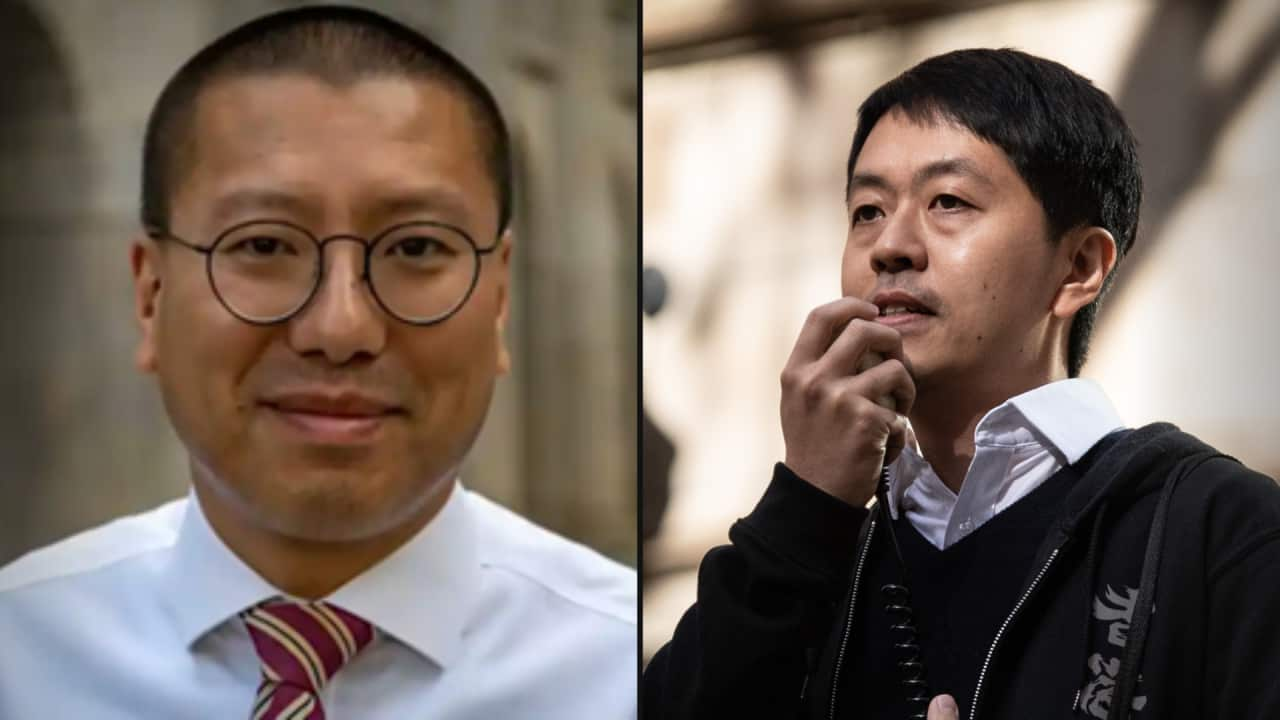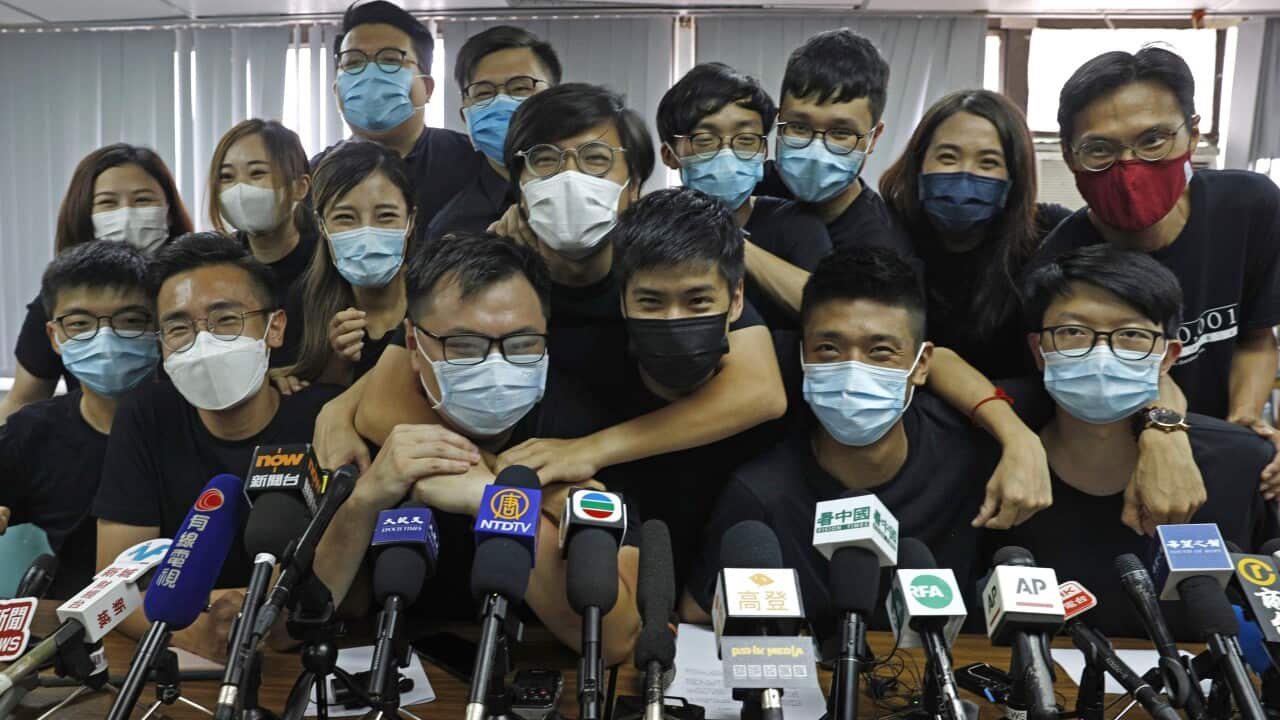Key Points
- Australian lawyer Kevin Yam and Australian resident Ted Hui are among eight overseas activists being pursued by Hong Kong.
- The pro-democracy activists have responded defiantly to the issuing of arrest warrants and 'bounties'.
- The Australian government has expressed concern over Hong Kong's actions.
Pro-democracy activists in Australia have remained defiant in the face of 'bounties' and arrest warrants issued by Hong Kong authorities.
Eight Hong Kong activists based in countries including Australia were issued with arrest warrants for alleged national security offences and will be "pursued for life", the territory's chief executive said.
"The only way to end their destiny of being an absconder who will be pursued for life is to surrender," John Lee told reporters on Tuesday.
Why have arrest warrants been issued for Hong Kong activists?
Hong Kong police issued arrest warrants for the eight overseas-based activists on Monday, accusing them of national security offences, including foreign collusion and incitement to secession, and offered rewards for information leading to their arrest.
The accused are Australian lawyer and legal scholar Kevin Yam, Australian resident and former Hong Kong Democracy party MP Ted Hui, Nathan Law, Anna Kwok, Finn Lau, former MP Dennis Kwok, unionist Mung Siu-tat, and online commentator Yuan Gong-yi.
The police also offered rewards of HK$1 million ($191,400) for information leading to each possible arrest.
The activists are based in several countries, including the United States, Britain and Australia.
Australia-based activists hit back at ‘tyranny’, ‘extreme authoritarianism’
Both Mr Hui and Mr Yam have responded defiantly to Hong Kong’s moves against them.
Mr Hui, a former Hong Kong legislator, has lived in Australia since 2021 on a bridging visa.
He said the "bounty" announced by Hong Kong police would not deter him from his pro-democracy activism, and that "free countries will not extradite us".
“I think the bounty itself is hilarious. It's ridiculous, and so I think it only aims to persecute dissent from the Hong Kong diaspora overseas. I think that's the only purpose,” Mr Hui told SBS News on Tuesday.
Mr Hui said the reward for information leading to his arrest “makes it clearer to the Western democracies that China is going towards more extreme authoritarianism”.

Former Hong Kong politician Ted Hui described the "bounty" put on him and other activists as "ridiculous". Source: SBS News / Peta Doherty
“I will continue to live an ordinary, normal life while I continue my advocacy work for freedom and democracy in Hong Kong,” Mr Hui said.
“For example, I'll still meet parliamentarians, and government officials, human rights groups, and all the Hong Konger communities in Australia and to unite them so that we are together, and to get stronger.”
Mr Yam, a senior fellow with Georgetown University's Centre for Asian Law, said he would continue to criticise what he described as "tyranny".
"It's my duty ... to continue to speak out against the crackdown that is going on right now, against the tyranny that is now reigning over the city that was once one of the freest in Asia.
"All they want to do is try to make a show of their view that the national security law has extra-territorial effect," said Mr Yam, who police accused of meeting foreign officials to instigate sanctions against Hong Kong officials, judges and prosecutors.
In , Mr Yam said it was an honour to be targeted alongside some of "the biggest names in the diaspora Hong Kong pro-democracy movement".
How has the Australian government responded?
Hong Kong authorities have been warned foreign interference laws could be used to investigate bounties imposed on democracy campaigners in Australia.
Foreign Minister Penny Wong told reporters on Tuesday she was deeply concerned about the application of the national security law in Hong Kong.
She also highlighted Australia's strong foreign interference laws.
"Our position on this is unequivocal and any allegations of foreign interference will be investigated by the appropriate authorities," Senator Wong said.
She said Australia supported freedom of expression and the right of Australians to express their political views peacefully.

Foreign Minister Penny Wong expressed concern over Hong Kong's use of its national security law to pursue activists. Source: AAP / Lukas Coch
Human Rights Watch associate Asia director Maya Wang said the Hong Kong government was increasingly going above and beyond to prosecute peaceful dissent.
"Offering a cross-border bounty is a feeble attempt to intimidate activists and elected representatives outside Hong Kong who speak up for people's rights against Beijing's growing repression," she said.
The organisation wants to see Beijing and Hong Kong officials held accountable via targeted sanctions.
Home Affairs Minister Clare O'Neil said the government supported people in Australia exercising their freedom of expression and assembly rights.
"These rights are essential to Australia's democracy," she wrote on Twitter.
Opposition acting foreign affairs spokesperson James Paterson said the Coalition was gravely concerned about the bounties for the arrests of Mr Yam and Mr Hui.
"This represents an unacceptable attempt to silence and intimidate critics of the Chinese government living in Australia, and further demonstrates the corrosive effects of the national security law to democratic principles and the rule of law in Hong Kong," he said.
"Australia must always defend the fundamental values of democracy including freedom of speech and assembly and can never tolerate attempts to undermine the safety and freedom of Australians."
How have other countries responded?
The United States condemned the move through a US State Department spokesman, who said it set "a dangerous precedent that threatens the human rights and fundamental freedoms of people all over the world".
UK foreign secretary James Cleverly said his government "will not tolerate any attempts by China to intimidate and silence individuals in the UK and overseas".
Chinese and Hong Kong authorities say the national security law, which has been criticised for being used to suppress Hong Kong's pro-democracy movement, has restored the stability necessary for preserving Hong Kong's economic success.

Hong Kong's Chief Executive John Lee (left) with China's President Xi Jinping. Source: AAP, AP / Selim Chtayti
"We want them to know that we will not sit and do nothing," he said.
He also appealed to members of the public to provide information on the activists.
The Inter-Parliamentary Alliance on China, a broad coalition of politicians around the world, said in a statement the move "confirms fears of Hong Kongers abroad and represents a dangerous escalation in Beijing's global war on dissent".











